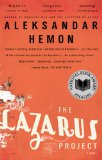Summary | Excerpt | Reviews | Beyond the Book | Readalikes | Genres & Themes | Author Bio

Responding to the siren smell of warm bread, he walks into a
grocery store at Clark and Webster—Ludwig’s Supplies, it is called.
His stomach growls so loudly that Mr. Ludwig looks up from the
newspapers on the counter and frowns at him as he tips his hat.
The world is always greater than your desires; plenty is never
enough. Not since Kishinev has the young man been in a store as
abundant as this: sausages hanging from the high racks like long
crooked fingers; barrels of potatoes reeking of clay; jars of pickled
eggs lined up like specimens in a laboratory; cookie boxes, the lives
of whole families painted on them—happy children, smiling women,
composed men; sardine cans, stacked like tablets; a roll of butcher
paper, like a fat Torah; a small scale in confident equilibrium; a
ladder leaning against a shelf, its top up in the dim store heaven.
In Mr. Mandelbaum’s store, the candy was also high up on the
shelf, so the children could not reach it. Why does the Jewish day
begin at sunset?
A wistful whistle of a teapot in the back announces the entrance
of a hammy woman with a crown of hair. She carries a gnarled loaf
of bread, cradling it carefully, as though it were a child. Rozenberg’s
crazy daughter, raped by the pogromchiks, walked around
with a pillow in her arms for days afterwards; she kept trying to
breast-feed it, boys scurrying at her heels hoping to see a Yid tit.
“Good morning,” the woman says, haltingly, exchanging glances
with her husband—they need to watch him, it is understood. The
young man smiles and pretends to be looking for something on the
shelf. “Can I help you?” asks Mr. Ludwig. The young man says nothing;
he doesn’t want them to know he is a foreigner.
“Good morning, Mrs. Ludwig. Mr. Ludwig,” a man says as he
enters the store. “How do you do today?” The little bell goes on
tinkling as the man speaks in a hoarse, tired voice. The man is old,
yet unmustached; a monocle dangles down his belly. He lifts his hat
at Mrs. and Mr. Ludwig, ignores the young man, who nods back at
him. Mr. Ludwig says: “How do you do, Mr. Noth? How is your
influenza?”
“My influenza is rather well, thank you. I wish I could say the
same thing for myself.” Mr. Noth’s walking stick is crooked. His tie
is silk but stained; the young man can smell his breath—something
is rotting inside him. I will never be like him, thinks the young man.
He leaves the cozy small talk and walks over to the board near the
front door to browse through the leaflets pinned to it.
“I could use some camphor,” Mr. Noth says. “And a new, young
body.”
“We’re out of bodies,” Mr. Ludwig says. “But we do have
camphor.”
“Worry not,” Mrs. Ludwig says, cackling. “This body will serve
you well for a long while.”
“Why, thank you, Mrs. Ludwig,” Mr. Noth says. “But do let me
know if some fresh bodies come in.”
Next Sunday at the Bijou, the young man reads, Joe Santley
stars in Billy the Kid. The Illinois Congress of Mothers offers a symposium
on “Moral Influence of Reading”; at the Yale Club Dr. Hofmannstal
is talking on “Shapes of Degeneracy: The Body and
Morality.”
The camphor jar and hat in his left hand, Mr. Noth struggles
to open the door with his right one, the stick moving up and
down his forearm. Mrs. Ludwig rushes over to help him, still carrying
the bread, but the young man reaches the door before her
and opens it for Mr. Noth, the little bell joyously jingling. “Why,
thank you,” Mr. Noth says and attempts to lift his hat, the stick
poking the young man in his groin. “Pardon me,” Mr. Noth says
and walks out.
“How can I help you?” Mr. Ludwig says from behind the counter,
even more coldly, for the young man is much too loose and
comfortable in his store. The young man returns to the counter
and points at the rack with lozenge jars. Mr. Ludwig says: “We
have all kinds of flavors: strawberry, raspberry, menthol, honeysuckle,
almond. Which would be your pleasure?” The young man
taps his finger on the jar with nickel-sized white lozenges, the
cheapest kind, and offers a dime to Mr. Ludwig. He has money to
spend on pleasure, he wants to show them. I am just like everybody
else, Isador always says, because there is nobody like me in
the whole world.
Excerpted from The Lazarus Project by Aleksander Hemon, Copyright © 2008 by Aleksander Hemon. Excerpted by permission of Riverhead Books, a division of Penguin Books, Inc. All rights reserved. No part of this excerpt may be reproduced or reprinted without permission in writing from the publisher.
Your guide toexceptional books
BookBrowse seeks out and recommends the best in contemporary fiction and nonfiction—books that not only engage and entertain but also deepen our understanding of ourselves and the world around us.